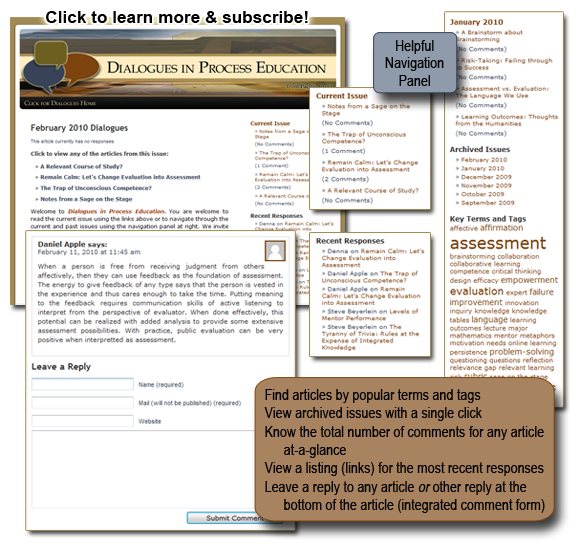|
Dialogues in Process Education is a monthly topic sheet that offers up four
thought-provoking articles for discussion. With six months worth of content
to explore, the chances are good that there's something there to pique your
interest and motivate you to join in the dialogues. Here are some highlights
from the most recent issue:
|
Teaching, Larning, & Environment: Shifting Perspectives
|
|
|
The characteristics that are typically seen as either
Faculty-centered, Learner-centered, or attributable to the
Learning Environment are far more interchangeable than we
tend to think. As a facilitator of learning, if you're
working to create students who Accept responsibility of
choice (which is a Learner-centered characteristic),
then the correlating characteristics are Soliciting input
(Faculty-centered) and Consensus building (Learning
Environment). The ability to shift perspectives in this way
is key to moving from one-on-one relationships to building a
community of self-directed learners. |
|
Getting Out of the Cave
|
| |
A powerful video adaptation of Plato's
"Allegory of the Cave" sets the stage for a discussion on the limits
of traditional pedagogical methods. It asks how we free our students
(and ourselves) to do more than watch 'shadows on the wall' and
begin learning from the real world. |
|
Belief vs. Alief
|
| |
Where beliefs are attitudes that we hold in response
to how things actually are, aliefs are more primitive
resonses to how things seem. For example, while we may know that the
observation platform of a skyscraper is safe (we believe it is), our
response to actually stepping out onto that platform is dictated by
what our senses and fears (rather than our reason) tell us. This
article explores the notion of an alief, applying it to
learning situations where students exhibit unreasonable assumptions
and misconceptions — aliefs
— and asks how separating beliefs from
aliefs might give us an advantage in helping students make the
critical shift from being constrained by their aliefs to empowered
by their beliefs. |
|
Teacher Evaluations and Student Success
|
| |
We excerpt an study published in the Journal of Political Economy
that examines the correlation between student evaluations (of
teachers) and grades. The study states that "professors who excel at
promoting contemporaneous student achievement teach in ways that
improve their student evaluations but harm the follow-on achievement
of their students in more advanced classes..." The question of how
we invest in student evaluations and what we can take from them is a
hot topic, to be sure! |
These four articles are typical of each issue of Dialogues. Our goal is to
poke, prod, test, try, question, introduce, play devil's advocate, and
wonder how clothed the emperors of education really are. This is not a
top-down, authoritative publication but rather an arena where we use the
lens of Process Education to look at the theories and practices of
education. Very little is off-limits — especially not our own favorite paradigms
and practices!
If you're interested in learning more, experiencing a sample issue,
or
subscribing to Dialogues, simply click anywhere in the image below.

|


